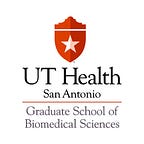Meghan Guzman: Scientific Research Impacts People Everywhere
“Subconsciously, I’ve always loved science,” said Meghan Guzman, a third year graduate student in the Infection, Inflammation, and Immunity discipline of the Integrated Biomedical Sciences program in Dr. Philip T. LoVerde’slaboratory.
When Guzman was in the third grade, her teacher asked her to pick a woman in history that she looked up to and she instantly chose Marie Curie.
“I know my mother has a picture of me dressed as Marie Curie, holding a pretend microscope somewhere (but I will spare y’all),” she said. “However, it wasn’t until my undergraduate career that my love for science and medicine took off.”
At first Guzman had her heart set on becoming a physician but after shadowing doctors, her plans changed.
“I always loved the lab aspect of all my coursework, especially microbiology,” she said. “I began applying for summer research programs, and was accepted to the Summer Undergraduate Research Fellowship program at Boston University working with an evolutionary biologist, and I have not looked back since. Best experience EVER.”
After graduation, Guzman applied to UT Health San Antonio.
“I originally wanted to study viruses and work in a BSL-4 laboratory, one of which are l
ocated at Texas Biomedical Research Institute ergo Microbiology and Immunology. Also, I appreciated the umbrella program the university was offering. I liked that I could study two different fields and find a way to bridge them together, which actually worked out great for me as I study human parasites in a biochemistry laboratory.”
Currently, Guzman studies the parasitic blood fluke of the genus Schistosoma, a neglected tropical disease that affects millions of people around the world.
“Over 250 million people are infected with this parasite in endemic areas, and there is only one drug to treat the disease, Praziquantel,” she explained. “Unfortunately, resistance is on the rise.”
While schistosomiasis does not affect the United States, it affects those (primarily children) in Africa, Asia, and South America.
“Our research, with our collaborators, has the ability to help a great number of people affected by this disease,” she said. “I think that’s pretty important.”
Her project focuses on understanding the genetic basis of drug resistance in Schistosoma spp.
“Through collaborations with medicinal chemists at the Center for Innovative Drug Discovery and structural biologists at UT Health San Antonio, we develop and test novel therapeutics to treat human schistosomiasis,” she said. “I love what I study. I think the host-parasite interaction is incredibly fascinating. I never thought I would love it this much.”
Guzman said if she could tell the public one thing it would be this.
“I would like people to know how important science, in general, is. The research performed at the UT Health has such a large impact on not only our community here in San Antonio, but also the science community across the nation and around the world. It is so important that we maintain that support of science and research.”
As Vice President of the Women of Science Development Outreach Mentoring Group and member of the Initiative for Maximizing Student Development program, Guzman also enjoys doing science outreach.
“I have had such a blast encouraging young kids to engage and love science,” she said. “To see their faces brighten up when they extract DNA from bananas is the best feeling.
This June, she will be traveling to New Orleans, LA to present her recent findings at the American Society for Microbiology (ASM) Microbe 2017 conference.
“I was very fortunate to have been awarded an ASM Student Travel Award, and an ASM Outstanding Student Abstract Award. In addition to presenting a poster, I was invited to give a Poster Talk in a specialized session on “Emerging Topics in Global Health.” I am incredibly excited to attend this conference, and share my research. This will be a fantastic opportunity to network with other students and researchers in my field.”
Outside of graduate school, she enjoys relaxing, spending time with friends and attending concerts in the area. After graduation she plans to apply for a post-doctoral position continuing to study schistosomiasis or apply for positions in industry.
“I haven’t really decided, however with the way San Antonio is growing, there may be many more opportunities come 2019.”
Copyright © 2017 The University of Texas Health Science Center at San Antonio
Links provided from the UTHSCSA pages to other websites do not constitute or imply an endorsement of those sites, their content, or products and services associated with those sites.
